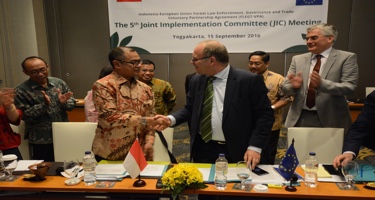
The Joint Implementation Committee for the Indonesian VPA met on 1 March 2018 in Jakarta to review experience with the first 15 months of licensing. According to information from the Indonesian SILK database and the Licensing Information Unit (LIU), more than 39,000 FLEGT licenses were issued during 2017. This means that FLEGT-licenses accounted for 18.2% of all V-Legal documents – paperwork accompanying Indonesian exports globally and guaranteeing timber legality – issued during that period.
The JIC recognised that while “for the vast majority of shipments the FLEGT licensing scheme has been applied without issues, in some cases problems have been encountered”. These problems were primarily attributed to the “novelty of the scheme” and a “need to gain experience with it”.
Problems identified by the JIC were basically the same ones reported to IMM during 2017 surveys and related to:
- HS Code mismatches
- Document discrepancies concerning quantities
- License formatting or appearance
- Comparability of the licenses received in the EU with copies stored in the SILK website.
As these issues started emerging soon after the beginning of licensing, a “Mini Action Plan” was agreed by Indonesia and the EU as early as the middle of last year, recognising the importance of ensuring smooth handling and release of imported goods in the EU, in order to maximise the green lane benefits of FLEGT-licensed timber. The Action Plan was designed to better understand reasons and identify solutions to the license mismatches. It also included measures to improve communication between the EU Competent Authorities (CAs) and the LIU.
In a first step, the EC, in cooperation with authorities from all Member States, produced a comprehensive report summarising all emergent problems with FLEGT licensed shipments to the EU; the report was shared with the Indonesian side.
Moreover, several actions have already been initiated to address the above problems:
- HS Codes: Indonesia and the EU agreed to align HS codes that were identified as problematic. Solutions were already found for a number of codes and others are being worked on.
- Document discrepancies concerning quantities: such discrepancies may occur for a variety of reasons, including human errors and/or changes in the shipment configuration. The FLEGT regulation and Indonesian VPA allow for a tolerance of 10% between weight and volume shown on the license and the corresponding shipment. The 10% variation in net weight and volume is allowed due to potential measurement variances, e.g. due to natural causes such as humidity changes or small mistakes in measurements. The 10% variance is not allowed for non-measured attributes such as units, species and HS Codes. The Indonesian government has already disseminated a Circular Letter to this effect and will continue disseminating this Letter. Indonesia and the EU will also continue to explore other options including:
- the legal feasibility of CAs accepting shipments where the actual quantity is more than 10% lower than stated on the FLEGT license
- the feasibility of issuing FLEGT licenses after full consolidation of the consignment.
- speeding up issuance of FLEGT documents.
- Revised/new FLEGT license issued after the shipment left Indonesia: this is currently not allowed under Indonesian law. However, several cases were identified, primarily for furniture shipments, where the date of issuance on the FLEGT license was later than the date of departure from Indonesia. Following investigation, these difficulties seem to have occurred when a new FLEGT-license applied for to reflect changes in shipment configuration was not issued in time before departure. The Action Plan recommends that, until a permanent solution has been found, CAs consult with LIU to ensure the authenticity of such licenses.
- License formatting and appearance: Cases were registered where FLEGT licenses arriving in the EU were printed on ordinary paper rather than the embossed one or with key elements (signature, barcode, logo, watermark) missing or incomplete. Indonesia and the EU are working on understanding the reasons behind such irregularities and on implementing a uniform standard of printing for licenses. At the same time, the feasibility of a fully electronic license system – something that would be welcome by European operators, according to IMM survey results – is also being explored.
Above all, effective communication between LIU and CAs was identified as crucial for resolving problematic licensing cases. The partners are working on implementing standardised communications procedures to fasten and improve information exchange.
